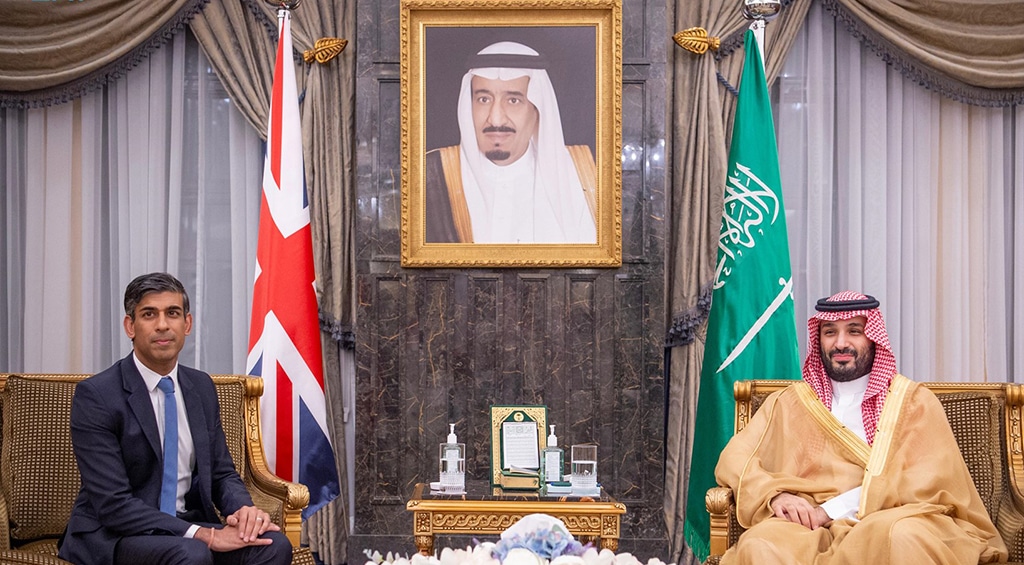
BEIRUT: Israeli air strikes killed 12 pro-Iran fighters in Syria yesterday, a monitor said, the latest in a spate of raids Israel has said targeted Iranian ambitions to develop a military presence on its doorstep. Israel has pledged to prevent its main enemy from entrenching itself militarily in Syria, where it is backing President Bashar Al-Assad's government alongside Russia and Lebanese militant group Hezbollah.
The pre-dawn raids killed seven foreign fighters in the Kisweh area south of Damascus, the Syrian Observatory for Human Rights said. Iranian and pro-Iran foreign fighters were present in the area, the Britain-based war monitor said, but the nationality of the dead was not immediately clear. Five Syrian members of a pro-Iranian group were also killed in the Ezra area of the southern province of Daraa, Observatory head Rami Abdel Rahman said.
A Syrian army source quoted by state news agency SANA said air defenses responded to two waves of Israeli strikes after midnight that targeted the Damascus area and then positions in Daraa and the adjacent province of Quneitra. "The attack wounded eight fighters," the source said, without elaborating on where they had been stationed or their nationality.
AFP correspondents in Damascus heard loud explosions around 1:15 am. State television broadcast images showing explosions in the sky. An Israeli army spokesman declined to comment on the strikes when contacted by AFP. Israel has carried out repeated strikes in Syria since the civil war erupted in 2011, mainly targeting government forces and their Iranian and Hezbollah allies. Israel's political leadership has spoken publicly of the bombing campaign, although the army rarely comments on individual strikes.
'Will not save' Idlib
Last month, Damascus accused the Israeli air force of carrying out an attack on the T4 airbase in central Syria, which the Observatory said killed at least three Iran-backed militiamen. In December, the Observatory said Israeli air strikes killed three foreigners fighting alongside government forces south of the capital. The previous month, the Israeli army claimed responsibility for a wave of air strikes against Syrian military sites and Iranian forces that killed 23 people including 16 foreigners.
Israeli Prime Minister Benjamin Netanyahu said positions of the Iranian Revolutionary Guards foreign operations arm were among the targets. The war in Syria has killed more than 380,000 people and displaced millions since it started in 2011 with the brutal repression of pro-democracy protests. The reported Israeli strikes come as government forces press a blistering offensive against Syria's last major rebel bastion, in the Idlib region in the northwest.
Erdogan-Putin relations
Meanwhile, deadly clashes between Syrian and Turkish forces are again testing the delicate relationship between President Recep Tayyip Erdogan and his Russian counterpart Vladimir Putin, though they have become masters at managing their competing interests. Once bitter rivals, Erdogan and Putin grew far closer after the failed coup in Turkey in 2016, when the Russian president took the opportunity to express his full support at a time when Ankara's Western allies were more lukewarm in their support.
Despite being on opposing sides of the conflicts in both Syria and Libya, they have also found it expedient to keep negotiations under their control as much as possible, leaving Western powers at arm's length. Still, it remains a tricky balancing act, particularly in Syria, where Turkey backs several rebel groups while Russia is the key supporter of President Bashar al-Assad. A Syrian offensive in the last rebel bastion of Idlib has sent another huge wave of refugees towards Turkey's borders. Clashes on Monday led to eight Turkish soldiers and civilians being killed, followed by at least 13 Syrian troops in retaliatory fire-the deadliest exchanges between the two armies since Turkey deployed into Syria in 2016.
Erdogan directed most of his anger at Damascus, but also criticized Moscow for failing to enforce the peace agreements supposed to prevent a full-blown Syrian offensive in Idlib, and warning it would not wait for a Russian green-light for further retaliation. "This escalation in Idlib will test relations between Erdogan and Putin. We can no longer speak of a simple honeymoon between these two strongmen," said Emre Kaya, of the Edam think-tank in Istanbul. Erdogan cannot ignore Russia's direct role in the current Idlib offensive, he added, given that Syrian units are trained and equipped by Moscow.
'Realpolitik'
In the end, the interests of the two sides appear irreconcilable. The Syrian regime is determined to retake the last rebel-held area, while Ankara refuses to countenance an offensive that has already displaced more than half a million people, according to UN monitors.
Erdogan said Wednesday that he was giving Damascus until the end of the month to pull back from areas around its 12 military observation posts in Idlib, which were set up under a 2018 deal with Russia. Two of those posts are now behind Syrian regime lines, Erdogan said. The episode has highlighted the complexity of ties between Russia and Turkey, whose rivalry stretches back into their imperial pasts and has been characterized by centuries of mistrust. The most recent nadir came in 2015 when Turkey shot down a Russian fighter jet that had strayed into its airspace.
But analysts say it is unlikely things will deteriorate to that level again in the near future, since they have become increasingly reliant on each other across sectors ranging from energy to trade to defense. "Ankara and Moscow are constrained to cooperate and maintain good relations, since the two countries are economically interdependent," said Jana Jabbour, of Sciences Po university in Paris. "The two countries know how to separate immediate tensions from their cooperation in key sectors," she said, adding that they always emphasized "realpolitik and pragmatism" in their dealings with each other. - Agencies










